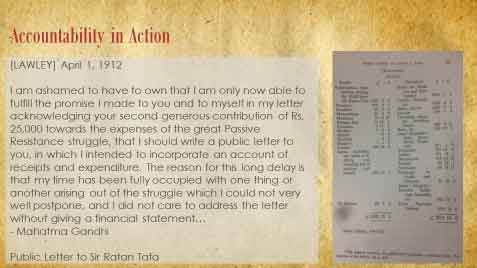The relationship between Mahatma Gandhi and the House of the Tatas was an unlikely partnership between one of India’s foremost industrial houses and the Father of the Nation
The two men couldn’t have been more dissimilar – Mohandas Karamchand Gandhi was a barrister, a man who would show the world that wars could be fought – and won - with truth and non-violence. Jamsetji Tata was an industrialist who worked hard to set India on the path to industrialisation and economic self-reliance. Despite Gandhiji’s avowed dislike of capitalism, he respected the Founder of the House of Tatas. On the occasion of the first death anniversary of the Founder in 1905, he wrote in the Indian Opinion that “…Mr Tata never looked to self-interest.… Though he possessed unlimited wealth, he spent nothing from it on his own pleasures. His simplicity was remarkable. May India produce many Tatas!”
That sentiment was only strengthened when serendipity brought him into contact with yet another Tata – Ratan Jamsetji Tata (1871-1918), the Founder’s younger son. Philanthropist and patriot, Ratan Tata was already extending his support towards the cause of the country’s freedom; his financial support enabled the functioning of the Servants of India Society, set up by Gopal Krishna Gokhale, Gandhiji’s political guru and one of India’s foremost statesmen.
By this time Gandhiji had already set up the Natal Indian Congress in South Africa and was experimenting with civil disobedience to protest racial discrimination and the curtailment of the civil rights of Indians in South Africa. Following Gokhale’s visit to Transvaal in 1909, Sir Ratan Tata made his first contribution to the cause of his countrymen suffering abroad. A princely sum of Rs25,000 was dispatched to Gandhiji through Gokhale. Sir Ratan Tata firmly believed that it was the duty of all Indians to provide material and moral support to this fight against injustice.
This was indeed a timely gift and Gandhiji made his gratitude known in a cable to Gokhale – "Pray thank Mr Tata for munificent timely help. Distress great. Prisoners' lot hard. Religious scruples disregarded. Rations short…”
A month later, in the December 1909 edition of the Indian Opinion, Gandhiji wrote that India had been roused by Sir Ratan Tata’s generous donation. “…he has given a powerful impetus to our movement. He will probably be followed by other Indians."
Gratified by the effect of his donation on his fellow countrymen and eagerly praying for the vindication of India’s honour abroad, Sir Ratan Tata sent a second cheque for Rs25,000 towards the Satyagraha campaign. He felt keenly that the success of this struggle in South Africa would soon resonate across the world. In 1912, he made yet another contribution towards the Transvaal Passive Resistance Fund. In total, between 1909 and 1913, Sir Ratan Tata contributed £5,000 to the cause in India and abroad.
Sir Ratan Tata’s generosity prompted Gandhiji to write a public letter thanking him for his unstinting support, both financial and moral. He also acknowledged, separately, that the paper, which was the mouthpiece of the movement in South Africa, would have been in dire straits if they didn’t have Sir Ratan Tata’s munificence to draw upon.

These were the ties that brought Gandhiji to Jamshedpur in 1925.. Addressing a 20,000-strong audience at the TISCO Institute, Gandhiji, an avowed foe of capitalism stated humbly that he had come there as a ‘friend of the capitalists; a friend of the Tatas.’ He was convinced that the success of the House of Tatas could herald a ‘miniature swaraj’.
The ties that bound the Tatas to Gandhiji and the struggle for freedom have indeed helped transform India into the world’s largest democracy.
Sources: Tata Central Archives | Tata.com
Quick links
About Jamsetji N. Tata | Early days of Jamsetji Tata
About Lady Meherbai Tata
About Sir Dorabji Tata | Sir Dorabji Tata: Catalyst for India's Olympic Debut
Sir Dorabji and Lady Meherbai Tata: A Partnership of Vision and Service
About Sir Ratan Tata | Sir Ratan Tata - Support to nationalistic causes
About Lady Navajbai Tata
Sir Ratan Tata and Lady Navajbai Tata: A Legacy of Generosity, Grace and Compassion
About JRD Tata
About Ratan N. Tata | A tribute from Cornell Chronicle
